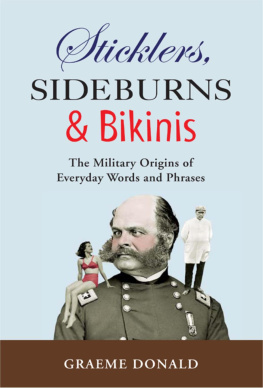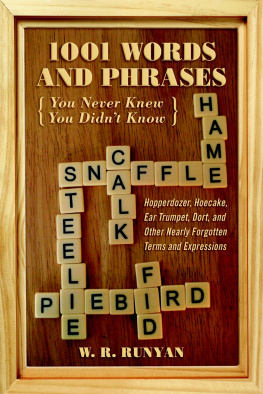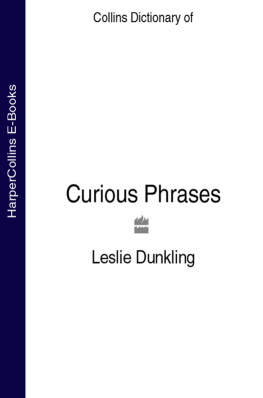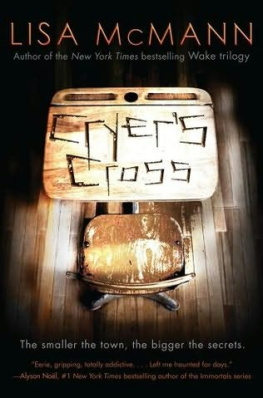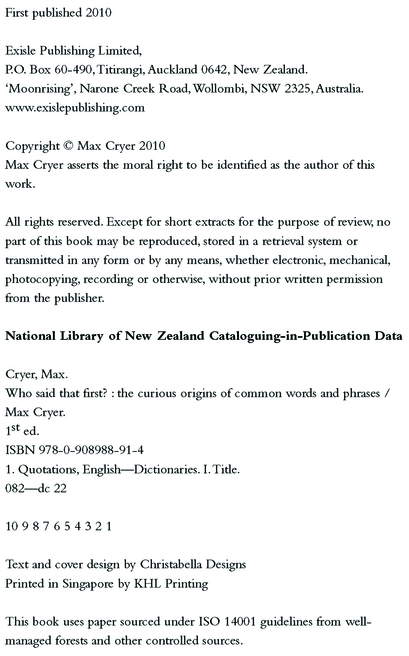The author thanks Joe Gilfillan, Graeme and Valerie Fisher, Robbie Ancell, Nigel Horrocks, Bryan Staff, Stephen Jennings, David Stevens, Geoffrey Pooch, Paul Barrett, Richard and Pamela Wolfe, and Ian Watt.
INTRODUCTION
After seeing a performance of Hamlet, a little old lady supposedly remarked, So many quotes! But she could well have said the same thing at any other point in her day. We are surrounded by quotes in everyday speech, not necessarily from Shakespeare.
Other bright minds have come up with expressions we now take for granted as part of the English language, and which we use freely in vernacular speech. But unlike Hamlet, the originators of many of our most useful second-hand remarks go uncredited.
Who said it first?
This collection sets out to credit as far as its possible to do so the people who actually created many familiar terms in common use. For example, poor Ernest Dowson is all but forgotten, but author Margaret Mitchell read his 1891 poem Non Sum Qualis and brought one phrase from that poem to the attention of millions. The phrase that caught her eye was ...gone with the wind. (In 1867, Dowson also wrote another familiar phrase: ...the days of wine and roses.)
And who remembers Mrs Daeda Wilcox? In 1887 she told her realtor husband about an attractive name she heard mentioned on a train as she was returning to her home in Los Angeles. Mr Wilcox liked it and immediately registered the land he owned nearby as Hollywood.
Sometimes it has to be acknowledged that an expression became known because someone other than the originator introduced an existing term to a wider public, either in print or by exclamation.
Only a limited number of people would know of Sir Edward Spencer Ford, but in 1992 he wrote a letter to the Queen making a kindly comment on the difficult year shed had. He included a variation on a phrase taken from the title of a 1667 poem by John Dryden.
In a speech soon afterwards, the Queen said:
1992 is not a year I shall look back on with undiluted pleasure. In the words of one of my more sympathetic correspondents, it has turned out to be an annus horribilis.The term annus horribilis hit the headlines immediately, clearly because of the impact of Elizabeth Windsor saying it, rather than Dryden or Sir Edward Spencer Ford.
This collection does not claim to include every expression in common usage that arose from a specified person there are too many to cover in one book. Two major (and rich) sources of English expressions the Bible and the works of Shakespeare have generally been excluded, partly because they have been covered many times before. One exception can be found under Red Sky, and Bernard Levins brilliant condensation of just some of Shakespeares expressions is reproduced by permission in section entitled The last word.
Some of our favourite and frequently used expressions date back to ancient civilisations and an impressive number come from 19th-century literary luminaries. Dickens, Thackeray and Scott have all left small but active landmarks on our speech but then so has party-girl Mandy Rice-Davies, who simply said, Well he would, wouldnt he?
Sometimes there are gentle surprises: brunch was invented in England in 1896; Graham Greene first linked fame with aphrodisiac; iron curtain had been in use for 40 years before Winston Churchill said it; we have P.G. Wodehouse to thank for straight from the horses mouth; and H. Rider Haggard for She who must be obeyed.
There is no evidence at all that Queen Victoria ever said We are not amused, or that Marie Antoinette said Let them eat cake. But Andy Warhol did say that everyone would be famous for 15 minutes.
Where did he say it, and when? Read on...
A
A1
In London in 1716, Edward Lloyd began publishing a weekly Lloyds List of shipping information. Ships were given two symbols: a letter of the alphabet used to classify ships hulls, attached to one of the initials G, M or B, signifying the ships equipment as Good, Middling or Bad.
In 1776 the quality of equipment symbols G,M,B were replaced by the numbers 1,2,3,4,5, still in combination with A,E,I,O,U. Thus A1 became a designation of the greatest excellence.
Absence makes the heart grow fonder
Born around 5045BC, the Latin poet Sextus Aurelius Propertius in one of his Elegies pronounced that Passion is always warmer towards absent lovers (Semper in absentes felicior aestus amantes).
The phrase first appeared in English 1500 years later as the title of a poem by an anonymous writer. This poem and others on the theme of absence were included in the collection called Poetical Rhapsody (1602), put together by Elizabethan poet (and spy) Francis Davison.
But the expression only began to assume the status of a proverb after 1844, following the publication of Englishman Thomas Haynes Baylys poem Isle of Beauty. The stanza which drew attention:
What would not I give to wander
Where my old companions dwell?
Absence makes the heart grow fonder:
Isle of Beauty, fare thee well!
Bayly never knew how widely used the phrase would become his poem appeared over a decade after he had died.
See also Out of sight, out of mind
Accidentally on purpose
Combining as it does two normally contradictory terms, accidentally on purpose is a fine example of an oxymoron. Its first known appearance was in the memoirs of prolific Irish writer and poet Sydney, Lady Morgan, published in 1862. Her use of quotation marks suggests the phrase may have already been known to her:
Dermody neglected the order
perhaps accidentally on purpose.
(The) affluent society
As far back as AD115, the Roman historian Cornelius Tacitus acknowledged that
Many who seem to be struggling with adversity are happy; many, amid great affluence, are utterly miserable.So the awareness wasnt new. After World War II, Canadian-born economist John Kenneth Galbraith contemplated the growing prosperity and materialism of America the increasing ownership of cars, televisions, home appliances etc., but observed that these consumer needs could be considered trivial against the importance of larger and less well financed public systems.
He coined a term intended to be ironic the affluent society, which in 1958 became the title of his widely discussed book. In later usage, the term lost its ironic overtones and simply came to mean general prosperity.
Agree to disagree
John Wesley, the English theologian who developed Methodism, had doctrinal differences with the evangelist George Whitefield, yet respected the other mans strength of belief and firmness of opinion. When Whitefield died in 1770, Wesley said in his sermon:
There are many doctrines of a less essential nature ... In these we may think and let think; we may agree to disagree. But, meantime, let us hold fast the essentials...


